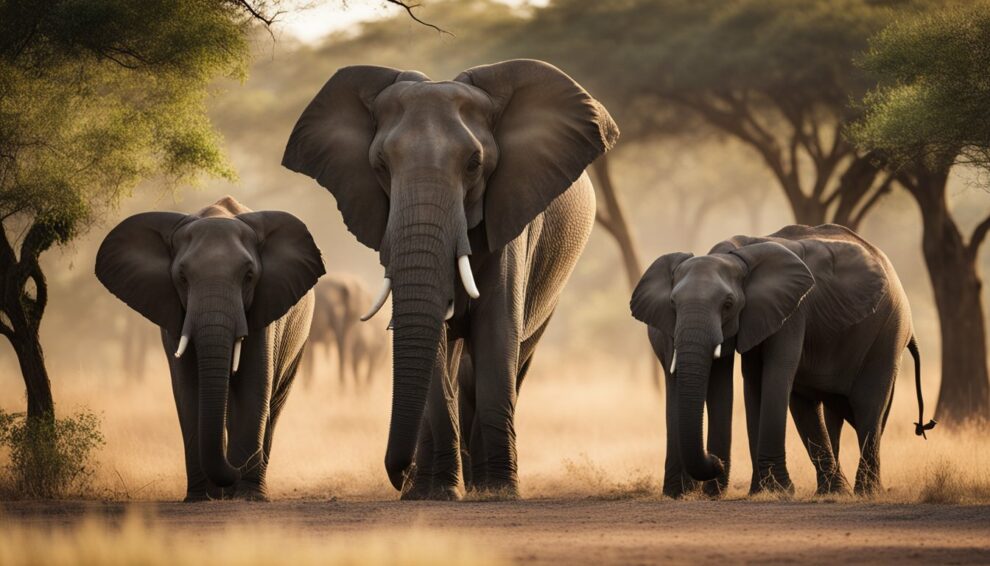Elephants are known for their incredible memory, which has been the subject of much research and fascination.
These majestic creatures are capable of remembering important information about their environment, other elephants, and even humans they have encountered.
In fact, elephants have been observed to remember specific individuals for decades, even after long periods of separation.

One reason for elephants’ remarkable memory is their large brain size, which is the largest of any land animal.
This allows them to store and process vast amounts of information, including complex social relationships and intricate details about their surroundings.
Additionally, elephants have been observed to use their memory to solve problems and adapt to changing environments, which is crucial for their survival in the wild.
Despite their impressive memory, elephants still face many threats in the wild, including habitat loss and poaching.
Understanding more about their memory and behavior can help us better protect these magnificent creatures and ensure their survival for generations to come.
The Science of Elephant Memory
Neural Networks and Longevity
Elephants have a remarkable ability to remember past events, including the location of watering holes, food sources, and even the faces of other elephants.
This is due in part to the structure of their brains, which contain a large number of neurons and synapses that allow for complex memory processing.
In fact, studies have shown that elephants have a higher density of neurons in their brains than any other animal, including humans.
This means that they have a greater capacity for processing and storing information, which contributes to their exceptional memory.
Furthermore, elephants have been known to live for up to 70 years in the wild, giving them ample time to accumulate a wealth of memories and experiences.
This longevity allows them to develop intricate social relationships and navigate complex environments with ease.
Emotional Recollections
Another factor that contributes to the remarkable memory of elephants is their ability to form emotional connections with other elephants and their surroundings.
Elephants are highly social animals that live in tight-knit family groups, and they rely on their memories to maintain these relationships.
For example, elephants have been observed mourning the loss of their companions and even returning to the site of their death years later.
This emotional attachment to their past experiences helps to cement these memories in their minds and allows them to recall them with great clarity.
In addition, elephants have been shown to exhibit signs of self-awareness and empathy, further highlighting their emotional intelligence and memory capabilities.
Overall, the science of elephant memory is a fascinating area of study that sheds light on the complex cognitive abilities of these magnificent creatures.
Social Bonds and Kinship

Matriarchal Leadership
Elephants are known for their strong social bonds and kinship ties.
Their social structure is matriarchal, which means that the oldest and most experienced female elephant, known as the matriarch, leads the herd.
The matriarch is responsible for making decisions about where the herd will go and when they will move.
She also plays an important role in protecting the herd from predators and other dangers.
The matriarch is not the only female elephant in the herd that holds a leadership role.
The other females in the herd also play an important role in decision-making and caring for the young.
In fact, female elephants are known for their strong bonds with each other, and they often work together to protect the herd and care for the young.
Recognizing Family and Friends
One of the most remarkable things about elephant memory is their ability to recognize and remember other elephants, even after long periods of separation.
Elephants are known to have a strong sense of family and kinship, and they are able to recognize their relatives and friends by sight, sound, and smell.
Elephants use a variety of cues to recognize each other, including the sound of their vocalizations, the scent of their urine and feces, and the texture and pattern of their skin.
They are also able to remember the voices and smells of elephants they have not seen in years.
This ability to recognize and remember other elephants is essential for their survival.
Elephants rely on their social bonds and kinship ties to navigate their environment, find food and water, and protect themselves from predators.
By remembering the past, elephants are able to build strong relationships and work together to overcome the challenges they face in the wild.
Navigating the Landscape

Elephants have an impressive spatial awareness that allows them to navigate through their environment with ease.
They can remember the location of water sources, food, and other important landmarks, even after long periods of time.
This remarkable memory is key to their survival in the wild.
Spatial Awareness
Elephants have a highly developed hippocampus, the part of the brain responsible for spatial memory.
They can remember the location of important resources such as water sources and food, and can even remember the routes they take to get there.
This allows them to efficiently navigate through their environment and avoid potential dangers.
In addition to their spatial memory, elephants also have a keen sense of smell.
They can detect water sources from miles away, and can even distinguish between different types of vegetation based on their smell.
This helps them to find the best food sources in their environment.
Migration Patterns
Elephants are known for their long-distance migrations, which can cover hundreds of miles.
These migrations are often driven by changes in the availability of food and water, as well as the need to avoid predators.
Despite the vast distances they travel, elephants are able to remember the routes they take and the locations of important resources along the way.
Research has shown that elephants use a combination of memory and communication to navigate during their migrations.
They are able to communicate with each other using low-frequency rumbling sounds that can travel for miles.
This allows them to stay in contact with each other and coordinate their movements, even when they are separated by long distances.
In conclusion, elephants have a remarkable memory that allows them to navigate through their environment and find important resources.
Their spatial awareness and sense of smell, combined with their ability to communicate with each other, make them one of the most adaptable and resilient species in the animal kingdom.
Interactions with Humans

Elephants have had a long history of interactions with humans, dating back to ancient times.
In some cultures, elephants are considered sacred and are revered for their intelligence and strength.
In others, they have been hunted for their ivory tusks or used for labor in agriculture and transportation.
Conservation Efforts
Unfortunately, elephants have faced many threats from humans, including habitat destruction, poaching, and human-elephant conflict.
As a result, many conservation efforts have been put in place to protect these magnificent animals.
One such effort is the establishment of protected areas, such as national parks and wildlife reserves, where elephants can roam freely without the threat of poaching or habitat loss.
In addition, anti-poaching patrols and laws banning the trade of ivory have been implemented to reduce the demand for elephant tusks.
Cultural Significance
Elephants also hold great cultural significance in many parts of the world.
In Thailand, for example, elephants have been a part of the country’s culture and religion for centuries.
They are often used in religious ceremonies and festivals and are considered a symbol of royalty and power.
In India, elephants are associated with the Hindu god Ganesha and are revered for their intelligence and strength.
They have also been used in traditional Indian medicine for their supposed healing properties.
Overall, the interactions between humans and elephants have been complex and varied throughout history.
While elephants have faced many challenges from humans, there are also many efforts being made to protect and conserve these remarkable animals for future generations to enjoy.
Frequently Asked Questions

How do elephants utilize their memory for survival in the wild?
Elephants have an incredible memory that allows them to remember important information about their environment and the location of vital resources such as water and food.
They use their memory to navigate across long distances and to recognize familiar individuals, both elephants and humans.
This helps to ensure their survival in the wild.
Can elephants recall individuals, both other elephants and humans, after long periods?
Yes, elephants have been known to remember individuals, both elephants and humans, even after long periods.
For example, elephants have been observed to recognize their family members, even after being separated for years.
They can also remember human faces and voices, which can be helpful in situations where they have had positive or negative experiences with humans.
In what ways is an elephant’s memory similar to or different from human memory?
An elephant’s memory is similar to human memory in many ways.
Both elephants and humans have long-term memory and can remember events that occurred many years ago.
However, elephants have a much better memory for spatial information and can remember the location of resources over long distances.
Additionally, elephants have a larger brain than humans, which may contribute to their superior memory capabilities.
What role does memory play in the social behavior of elephants?
Memory plays an important role in the social behavior of elephants.
Elephants have complex social structures and use their memory to recognize and remember other individuals within their social group.
They also use their memory to remember past interactions with other elephants, both positive and negative, which can influence their future behavior.
How long is an elephant’s memory span, and what factors influence it?
The memory span of an elephant can vary depending on a variety of factors, including age, gender, and individual differences.
Some studies suggest that elephants can remember events that occurred up to 10 years ago.
However, more research is needed to fully understand the extent of their memory capabilities.
What does the phrase ‘an elephant never forgets’ mean in the context of their memory capabilities?
The phrase ‘an elephant never forgets’ is often used to describe the remarkable memory capabilities of elephants.
While it is not entirely accurate, as elephants can forget certain things, it is a testament to their impressive memory abilities.
Elephants have a long-term memory that allows them to remember important information about their environment and the individuals within their social group, which is essential for their survival in the wild.









